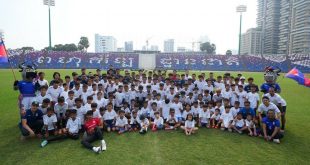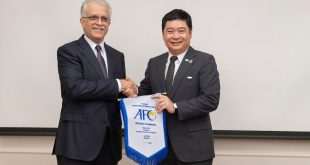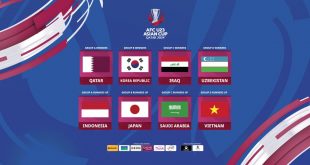 Women’s football has witnessed remarkable growth in recent times, particularly in 2022, off the back of record engagement figures at the 2022 AFC Women’s Asian Cup – India.
Women’s football has witnessed remarkable growth in recent times, particularly in 2022, off the back of record engagement figures at the 2022 AFC Women’s Asian Cup – India.
With the 2023 FIFA Women’s World Cup – Australia & New Zealand in July set to ramp interest up to sky-high levels, a timely AFC Women’s Football Online Session 2023 was held on Tuesday afternoon, May 30, by the Asian Football Confederation (AFC) for its Member Associations (MAs) with the theme of Developing Women’s Football.
Key to that is the fostering of more conducive environments for women at all levels of football, which was masterfully touched upon in the 90-minute event courtesy of presentations from guest speakers Anna Malmén and Jarmo Matikainen to 103 participants from 38 MAs.
The duo were introduced by AFC Head of Women’s Football, Bai Lili, who also gave an overview of the latest AFC Women’s Football Day activities and the Confederation’s best wishes to the record six AFC representatives at the FIFA Women’s World Cup.
Malmén, a Club Development Officer at the Swedish Football Association (FA) who has been part of the UEFA Club Development Working Group since 2020, gave insights on the importance of a robust club development structure and provided context with the ongoing efforts in her country.
In a population of 10.7 million where 40 per cent of all sport activities is football, the Swedish FA provides broad support to clubs across 24 Regional Associations – backed by the Swedish Sports Confederation – to develop better club environments. With 30 per cent of the 600,000 active players being female, equality is emphasised in the programmes.
One of those, the Quality Club programme, lays out different sets of focus areas and points for clubs, and provides free tools and relevant support. Furthermore, two initiatives to encourage more female involvement have been put in place: a coach education programme that offers a free UEFA B License course, and an education programme that focuses on the understanding of menstrual cycles.
“We have a fair number of women coaching when they are young but… when they become older, we get a big drop off,” the 33-year-old said. “We had 24 spots (available) at the beginning but at the moment we have 96 (applications), so it’s four times as many.”
Malmén noted that the initiatives are fully funded by partners and sponsors – proof that there are parties who “really want to invest” in women’s football. Ultimately, a strong club development ecosystem ties into the new strategy for Swedish football, unveiled in March this year: to be the national sport for everyone, everywhere.
Continuing in the same vein, Matikainen elaborated on the need to heighten the visibility of women in coaching courses by updating them with women’s football specifics and competencies.
The Finn, head coach of the Finland Under-23 Women’s National Team and a UEFA Technical Observer and Instructor since 2006, gave the examples of annual seminars and refresher courses for women’s and girl’s coaches that take place on a regular basis in Finland. He pointed out that UEFA Women’s Football Competence Framework can be used as a reference by National Associations for coach education programmes.
“There are clear competencies that are female player-specific… at every coaching level that are worth considering,” the 63-year-old said. “An important part is to educate the instructors who are delivering the courses; we are so used to using a certain type of material that makes women invisible, so we need to make women visible and that requires a little bit of further discussion and education.”
Matikainen also touched on the value of utilising technical reports to improve awareness in the coaching community, citing UEFA’s reports and studies – such as those from the 2022 UEFA European Women’s U17 and U19 Championships, and Women’s Champions League – as a resource to keep up with the latest trends.
AFC Technical Director Andy Roxburgh expressed appreciation to both speakers for sharing their expertise, amid “exciting times” for women’s football in Asia.
“We are going to be co-hosting the 2023 FIFA Women’s World Cup – Australia & New Zealand, it’s the first time we have 32 teams and six will be from AFC so it will be very exciting,” he said. “Also exciting is the development of the AFC Women’s Champions League… that is a great step for us. The AFC Women’s Asian Cup continues to go from strength to strength… the last edition was a success and we are looking forward to 2026.”
 Arunava about Football A look at football & the world through my eyes!
Arunava about Football A look at football & the world through my eyes!



